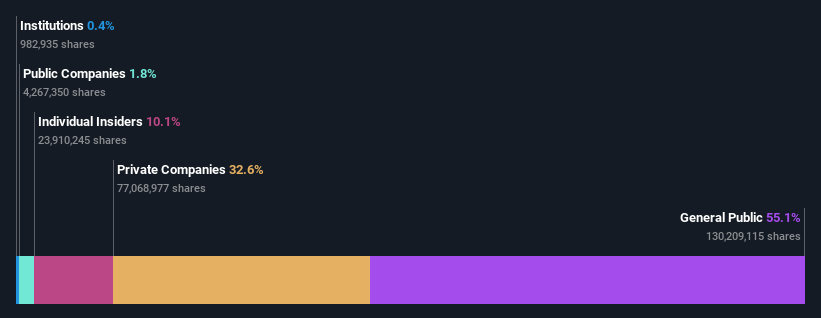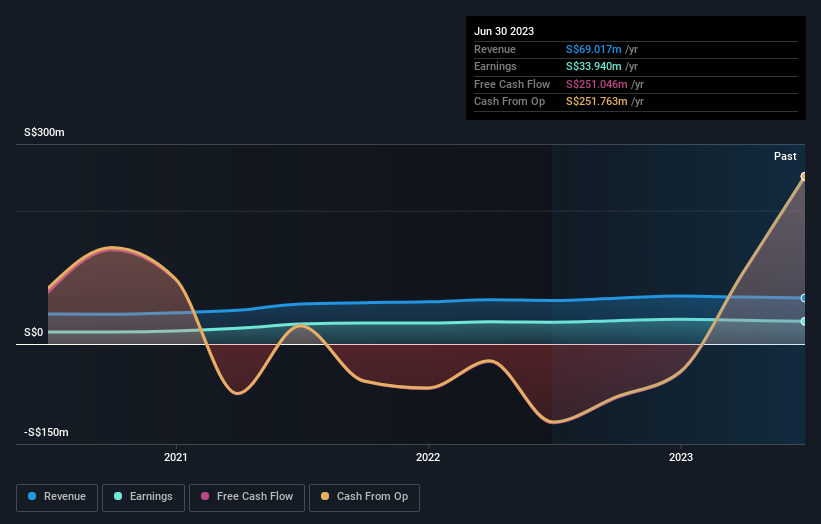Private companies own 33% of Sing Investments & Finance Limited (SGX:S35) shares but individual investors control 55% of the company
Key Insights
Sing Investments & Finance's significant individual investors ownership suggests that the key decisions are influenced by shareholders from the larger public
A total of 22 investors have a majority stake in the company with 45% ownership
Every investor in Sing Investments & Finance Limited (SGX:S35) should be aware of the most powerful shareholder groups. We can see that individual investors own the lion's share in the company with 55% ownership. Put another way, the group faces the maximum upside potential (or downside risk).
Private companies, on the other hand, account for 33% of the company's stockholders.
In the chart below, we zoom in on the different ownership groups of Sing Investments & Finance.
View our latest analysis for Sing Investments & Finance
What Does The Lack Of Institutional Ownership Tell Us About Sing Investments & Finance?
We don't tend to see institutional investors holding stock of companies that are very risky, thinly traded, or very small. Though we do sometimes see large companies without institutions on the register, it's not particularly common.
There are multiple explanations for why institutions don't own a stock. The most common is that the company is too small relative to funds under management, so the institution does not bother to look closely at the company. It is also possible that fund managers don't own the stock because they aren't convinced it will perform well. Sing Investments & Finance might not have the sort of past performance institutions are looking for, or perhaps they simply have not studied the business closely.
Hedge funds don't have many shares in Sing Investments & Finance. Looking at our data, we can see that the largest shareholder is F. H. Lee Holdings (Pte) Limited with 28% of shares outstanding. In comparison, the second and third largest shareholders hold about 2.6% and 1.9% of the stock.
On studying our ownership data, we found that 22 of the top shareholders collectively own less than 50% of the share register, implying that no single individual has a majority interest.
While studying institutional ownership for a company can add value to your research, it is also a good practice to research analyst recommendations to get a deeper understand of a stock's expected performance. As far as we can tell there isn't analyst coverage of the company, so it is probably flying under the radar.
Insider Ownership Of Sing Investments & Finance
The definition of an insider can differ slightly between different countries, but members of the board of directors always count. Management ultimately answers to the board. However, it is not uncommon for managers to be executive board members, especially if they are a founder or the CEO.
I generally consider insider ownership to be a good thing. However, on some occasions it makes it more difficult for other shareholders to hold the board accountable for decisions.
It seems insiders own a significant proportion of Sing Investments & Finance Limited. Insiders have a S$24m stake in this S$235m business. It is great to see insiders so invested in the business. It might be worth checking if those insiders have been buying recently.
General Public Ownership
The general public, who are usually individual investors, hold a substantial 55% stake in Sing Investments & Finance, suggesting it is a fairly popular stock. This level of ownership gives investors from the wider public some power to sway key policy decisions such as board composition, executive compensation, and the dividend payout ratio.
Private Company Ownership
We can see that Private Companies own 33%, of the shares on issue. It's hard to draw any conclusions from this fact alone, so its worth looking into who owns those private companies. Sometimes insiders or other related parties have an interest in shares in a public company through a separate private company.
Next Steps:
It's always worth thinking about the different groups who own shares in a company. But to understand Sing Investments & Finance better, we need to consider many other factors. Consider risks, for instance. Every company has them, and we've spotted 1 warning sign for Sing Investments & Finance you should know about.
Of course this may not be the best stock to buy. So take a peek at this free free list of interesting companies.
NB: Figures in this article are calculated using data from the last twelve months, which refer to the 12-month period ending on the last date of the month the financial statement is dated. This may not be consistent with full year annual report figures.
Have feedback on this article? Concerned about the content? Get in touch with us directly. Alternatively, email editorial-team (at) simplywallst.com.
This article by Simply Wall St is general in nature. We provide commentary based on historical data and analyst forecasts only using an unbiased methodology and our articles are not intended to be financial advice. It does not constitute a recommendation to buy or sell any stock, and does not take account of your objectives, or your financial situation. We aim to bring you long-term focused analysis driven by fundamental data. Note that our analysis may not factor in the latest price-sensitive company announcements or qualitative material. Simply Wall St has no position in any stocks mentioned.

 Yahoo Finance
Yahoo Finance 

